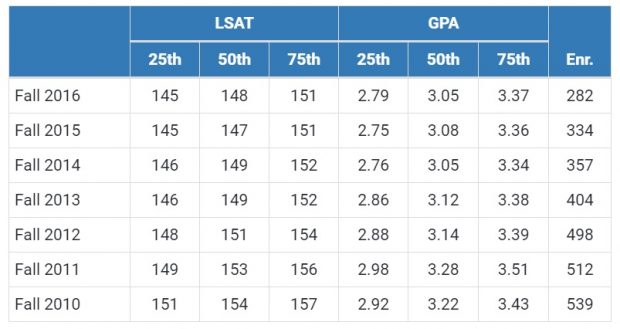Major University System With Top 50 Law School In Talks To Take Over Unranked Law School
Why are the schools considering such an arrangement?
 Law schools across the country are in trouble. Some have merged with other law schools (Hamline and William Mitchell), some have closed or are in the process of closing (Indiana Tech, Whittier, and Valparaiso), and some have been absorbed into larger universities (Cooley). Now comes word that another private law school is in talks to become part of one of the largest public university systems in the country.
Law schools across the country are in trouble. Some have merged with other law schools (Hamline and William Mitchell), some have closed or are in the process of closing (Indiana Tech, Whittier, and Valparaiso), and some have been absorbed into larger universities (Cooley). Now comes word that another private law school is in talks to become part of one of the largest public university systems in the country.
As first reported by Crain’s Chicago Business, the University of Illinois at Chicago (UIC) is in “preliminary discussions” for a takeover of Chicago’s John Marshall Law School (JMLS). These discussions have been going on for the past 16 months, and following a financial assessment, both schools have determined that such an arrangement would be feasible. If John Marshall were to formally become a part of UIC, it would be the only public law school in Chicago. Why are UIC and JMLS considering this arrangement? From the schools’ FAQ page:
UIC is one of the few public research universities designated with the highest Research 1 classification by the Carnegie Foundation that does not have a law school. Sixty-five percent of all Research 1 universities, public and private, have a law school.
The John Marshall Law School is an independent law school and the possibility of becoming Chicago’s only public law school would allow it to expand its current mission and grow its quality, unique programs within a strong public university.
A natural alignment exists between UIC’s public mission and JMLS’s commitment to provide access and opportunity to students from underserved communities and to help fill the justice gap for citizens in the Chicago area. The new arrangement would fill a significant void in the country’s third largest city. Chicago is one of very few major cities in the United States without a public law school.

Legal AI: 3 Steps Law Firms Should Take Now
This isn’t the first time that UIC and JMLS have had discussions like this. Back in 1998, the schools attempted to negotiate a similar relationship, but the deal fell apart. This time, if the discussions between the University of Illinois at Chicago and John Marshall Law come to fruition, JMLS students would become UIC students, and JMLS faculty and staff would become UIC employees. A possible name being floated is the University of Illinois at Chicago’s John Marshall Law School.
If you recall, the University of Illinois system already has a law school — one that was embroiled in scandal back in 2011 for inflating the LSAT scores it reported to the American Bar Association. The University of Illinois College of Law is currently ranked No. 44 by U.S. News and World Report (and ranked No. 22 by Above the Law). John Marshall’s U.S. News rank, on the other hand, is not published, meaning that it falls among the bottom quarter of law schools. Here are John Marshall’s entering admissions statistics since 2010:

(Table via Law School Transparency)
While that looks relatively unappealing, perhaps UIC is hoping for a situation similar to what happened when Texas A&M took over Texas Wesleyan — the school went from having its U.S. News rank unpublished to being a top 100 school in just four years. That being the case, current John Marshall law students must be crossing their fingers in the hope that their school becomes part of UIC.
Sponsored

Legal AI: 3 Steps Law Firms Should Take Now

Navigating Financial Success by Avoiding Common Pitfalls and Maximizing Firm Performance

The Business Case For AI At Your Law Firm


Early Adopters Of Legal AI Gaining Competitive Edge In Marketplace
Should this deal fall apart once again, John Marshall would continue to operate as a standalone law school as it’s done for more than 100 years. Best of luck to all parties involved in this prospective takeover.
FAQs: The John Marshall Law School and UIC [JMLS / UIC]
Discussions with The John Marshall Law School [UIC Today]
UIC may absorb John Marshall Law School [Crain’s Chicago Business]
University of Illinois at Chicago is in talks about taking over a local law school [American School & University]
University of Illinois at Chicago reveals ‘preliminary discussions’ to add John Marshall Law School [ABA Journal]
 Staci Zaretsky has been an editor at Above the Law since 2011. She’d love to hear from you, so please feel free to email her with any tips, questions, comments, or critiques. You can follow her on Twitter or connect with her on LinkedIn.
Staci Zaretsky has been an editor at Above the Law since 2011. She’d love to hear from you, so please feel free to email her with any tips, questions, comments, or critiques. You can follow her on Twitter or connect with her on LinkedIn.
Sponsored

Early Adopters Of Legal AI Gaining Competitive Edge In Marketplace








